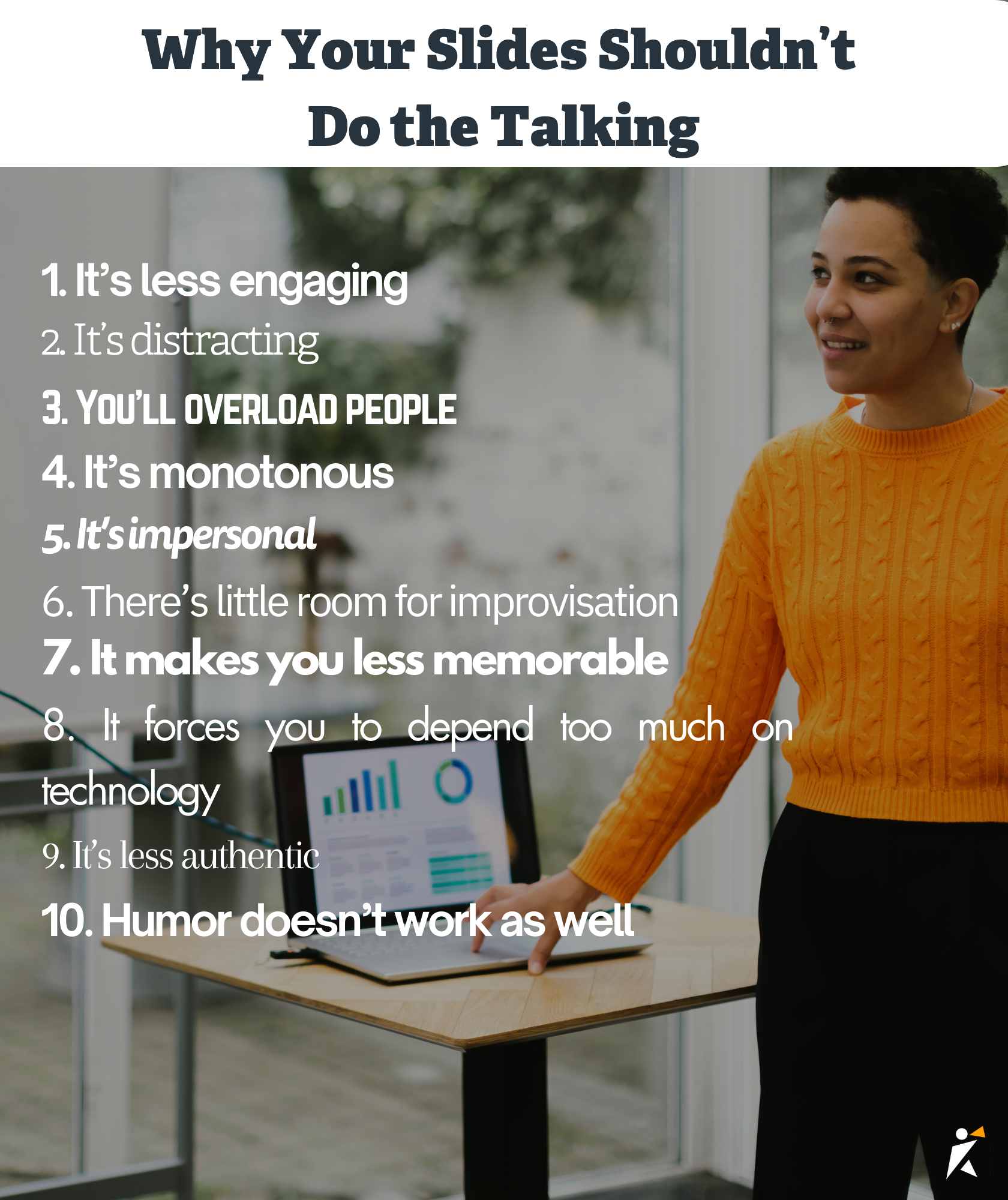Why Your Slides Shouldn’t Do the Talking

We’ve all been to a presentation where the speaker just ran through a set of slides and read out what was written on them. They suck. In fact, they’re what give PowerPoint presentations a bad name.
Instead of letting your slides do the talking, the alternative is to use them as a visual reminder that you refer back to as you give your talk. Some people like to write a script for their presentation, but that leaves you with the same problem. You’ll end up just reading something out to people.
But I’m getting ahead of myself, so let’s just dive in. Here’s why you shouldn’t allow your slides to do the talking.

1. It’s less engaging
Now, this point might be obvious, but that’s because it’s by far the most important of the lot. When your slides are covered with text, your presentations are much less engaging because there’s no warmth and character. Instead of people leaning in to listen and relating to what you’re saying, they’ll lean away with their arms folded. To quote The Beatles, they’ll turn off their minds, relax, and float downstream.
2. It’s distracting
Talkative slides are super distracting because people will sit there reading the slides instead of listening to whatever you’re talking about. It’s like trying to converse with someone while someone else is standing behind them, juggling fireballs with all of their clothes off. You might soldier on with the conversation, but you won’t pay as much attention as you would if the distraction wasn’t there.
3. You’ll overload people
As a public speaker, you need to be wary of how much information you give to people. If you give them too much, they won’t be able to process it, and more often than not, they won’t remember anything at all. Instead of overloading people by packing as much information as you can into your slides, you’ll want to think carefully about what you want people to take away with them. Less is more.
4. It’s monotonous
When you present people with slide after slide of written information, it becomes boring and monotonous for them to sit through. Often, it has the effect of slowing everything down, and so a piece of information that could take two minutes to convey ends up taking ten. And because it takes so much longer, there’s a good chance that people will forget what you were saying.
5. It’s impersonal
When people are looking at written information on a screen, there’s no personal connection. Contrast that to a public speaker who is standing right in front of you, making eye contact and potentially tailoring their talk to their audience. Attendees can ask speakers direct questions and even meet up with them after the presentation. They can’t do that with information they’re reading from a screen.
6. There’s little room for improvisation
When your slides are doing the talking, it’s like when you’re reading from a script. Skipping a slide is like skipping a page. It will be jarring for the audience and leave them feeling as though something is missing. And while it’s usually a good idea to elaborate on what’s written on your slides, it doesn’t work well when you’re just reading from them. When you add things, people will wonder why it wasn’t written down with the rest of the information.
7. It makes you less memorable
If you rely on your slides too much, no one will remember you. And if they do, it will be as “that person who read from their slides.” People will remember the slides more than you and they will likely forget your message. If you’re speaking at a conference alongside other people, relying too heavily on your slides is a surefire way of making sure you’re forgotten.
8. It forces you to depend too much on technology
Relying on technology is never a good idea. That’s because it’s notorious for going wrong, and if you’re relying too heavily on it to deliver your presentation, you could find yourself struggling if it fails. That’s why it’s better to keep your slides short so you can print off a copy and use that if you have to. But that doesn’t work too well if your presentation relies on the audience reading your slides.
9. It’s less authentic
This point comes from the fact that when your slides are doing the talking, it’s less engaging and more impersonal. This means that when you speak to people, it comes across as insincere. Imagine someone telling you that they love you. Wouldn’t it sound more authentic if they spoke from the heart rather than read from a script?
10. Humor doesn’t work as well
Humor can be a great way to bring a presentation to life, but it doesn’t work too well if you rely on people reading the humor from the screen. Everyone will reach the punchline at different times, and if you do get a laugh from people, it’ll be scattered laughter at best. But given how difficult it is to make written humor work, you’ll be lucky even to get that.
Conclusion
Now that you know why your slides shouldn’t do the talking, it’s time for you to take a closer look at your presentations and make whatever changes you think are necessary. Some speakers even do away with slides altogether.
In the meantime, we’d love to hear from you so we can keep the discussion going. How do you make sure that your slides don’t do the talking? Be sure to let us know in the comments.
You can also follow us on your favorite social networking sites for more so you don’t miss another article. We’ll see you soon!





